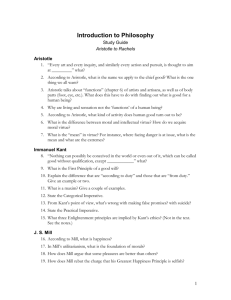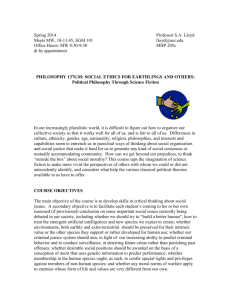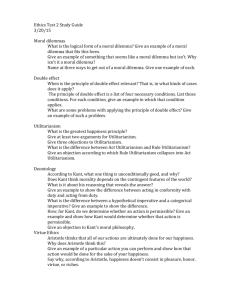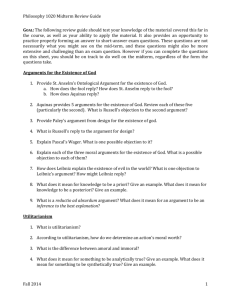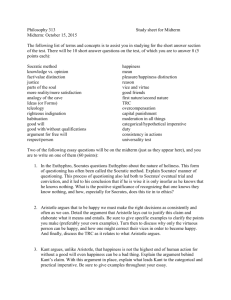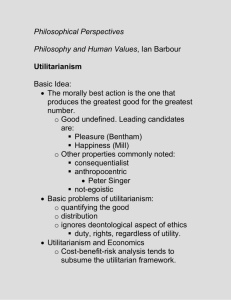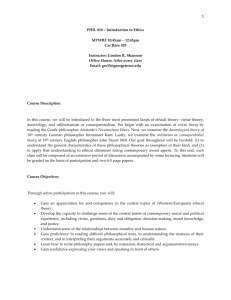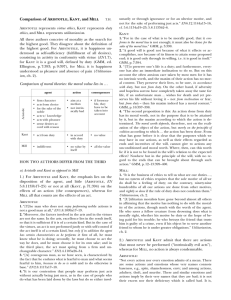- University at Albany
advertisement
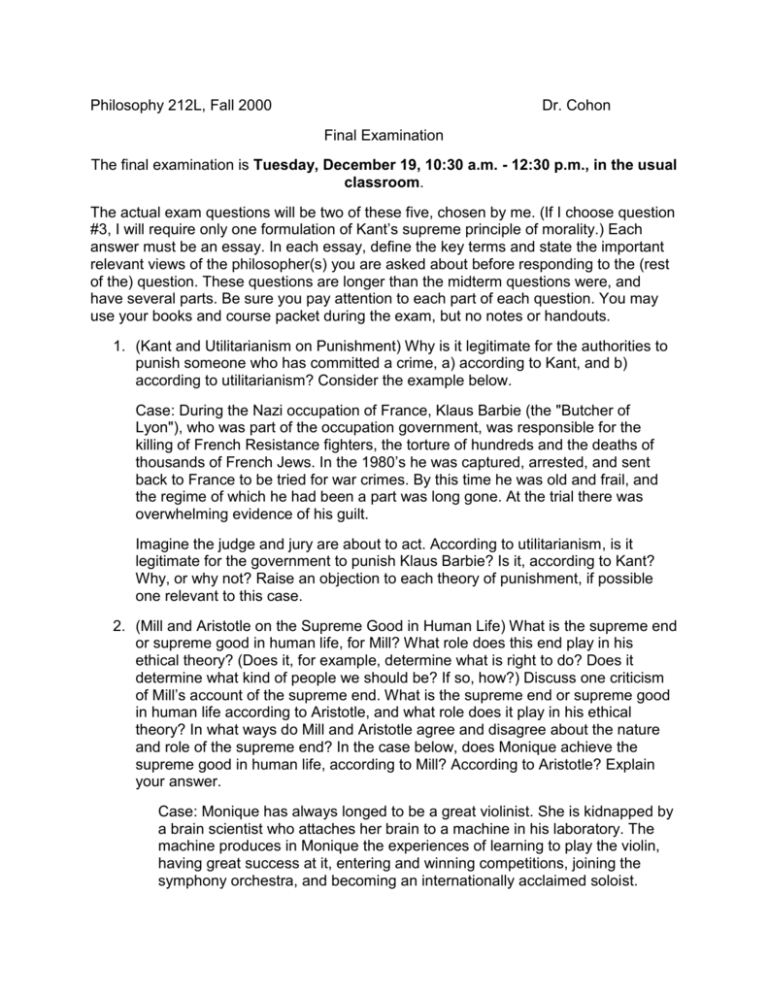
Philosophy 212L, Fall 2000 Dr. Cohon Final Examination The final examination is Tuesday, December 19, 10:30 a.m. - 12:30 p.m., in the usual classroom. The actual exam questions will be two of these five, chosen by me. (If I choose question #3, I will require only one formulation of Kant’s supreme principle of morality.) Each answer must be an essay. In each essay, define the key terms and state the important relevant views of the philosopher(s) you are asked about before responding to the (rest of the) question. These questions are longer than the midterm questions were, and have several parts. Be sure you pay attention to each part of each question. You may use your books and course packet during the exam, but no notes or handouts. 1. (Kant and Utilitarianism on Punishment) Why is it legitimate for the authorities to punish someone who has committed a crime, a) according to Kant, and b) according to utilitarianism? Consider the example below. Case: During the Nazi occupation of France, Klaus Barbie (the "Butcher of Lyon"), who was part of the occupation government, was responsible for the killing of French Resistance fighters, the torture of hundreds and the deaths of thousands of French Jews. In the 1980’s he was captured, arrested, and sent back to France to be tried for war crimes. By this time he was old and frail, and the regime of which he had been a part was long gone. At the trial there was overwhelming evidence of his guilt. Imagine the judge and jury are about to act. According to utilitarianism, is it legitimate for the government to punish Klaus Barbie? Is it, according to Kant? Why, or why not? Raise an objection to each theory of punishment, if possible one relevant to this case. 2. (Mill and Aristotle on the Supreme Good in Human Life) What is the supreme end or supreme good in human life, for Mill? What role does this end play in his ethical theory? (Does it, for example, determine what is right to do? Does it determine what kind of people we should be? If so, how?) Discuss one criticism of Mill’s account of the supreme end. What is the supreme end or supreme good in human life according to Aristotle, and what role does it play in his ethical theory? In what ways do Mill and Aristotle agree and disagree about the nature and role of the supreme end? In the case below, does Monique achieve the supreme good in human life, according to Mill? According to Aristotle? Explain your answer. Case: Monique has always longed to be a great violinist. She is kidnapped by a brain scientist who attaches her brain to a machine in his laboratory. The machine produces in Monique the experiences of learning to play the violin, having great success at it, entering and winning competitions, joining the symphony orchestra, and becoming an internationally acclaimed soloist. Years pass, and all the while Monique is merely lying in a room, being fed through a tube, while she has these entirely convincing hallucinations and all the pleasures they induce. She grows old and dies, believing until the end that she is a great violinist. (Example based on Robert Nozick’s story of the experience machine, Anarchy, State and Utopia, Basic Books 1974.) 3. What is the supreme principle of morality, according to Kant, and according to Mill? (For Kant’s principle, be prepared to explain both the formula of the end in itself and the universal law formula. Only one of them will be on the test, however, if I use this question.) Briefly explain how we are supposed to use each principle, Kant’s and Mill’s, to figure out whether an action is right or wrong. Then say what action would be right to do in the case below, according to Kant’s test, and then according to Mill’s test. Case: As Mrs. N.'s lawyer, you have promised to execute the terms of her will after she dies. Years ago she had you draw up a will leaving her substantial fortune to a famine relief fund. When she dies and you go through her papers, however, you find a more recent, legally binding will, written and signed by Mrs. N. herself, in which she bequeaths all her money to her lazy niece, who (you know) will spend it on beer and Beanie Babies. No one else knows of the later will, but by law a later will supplants an earlier one. Should you execute the later will? Or should you secretly destroy it, act as if it never existed, and carry out the terms of the earlier one (giving the money to famine relief)? (Based on an example by C. Korsgaard.) 4. (Act and Rule Utilitarianism) Explain act utilitarianism and rule utilitarianism. How are they alike and how different? Illustrate the difference with an example. 5. (Aristotle and Kant on Good People and Good Motives) Explain Aristotle's conceptions of a virtuous person and a virtuous action, and give examples using two of the virtues that he discusses. What are the roles of reason and desire in directing the conduct of the virtuous person? Compare and contrast Aristotle’s view of the virtuous person and virtuous action with Kant's conceptions of a good person (a person with a good will) and a morally good action (an action with moral worth). Would Aristotle and Kant agree about which actions are done for the best motives?
